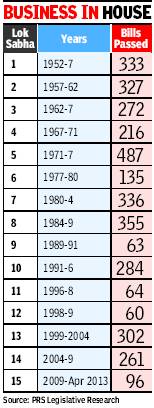The 15th Lok Sabha: 2009-14
(Created page with "== Add Title/Subtitle == 500px {| class="wikitable" |- |colspan="0"|<div style="font-size:100%"> This is a newspaper article selected for ...") |
|||
| Line 26: | Line 26: | ||
As pressing issues raised by MPs spill out of zero hour into question hour and after, the proportion of time spent by Parliament on core legislative business is falling, says Chakshu Roy of PRS. | As pressing issues raised by MPs spill out of zero hour into question hour and after, the proportion of time spent by Parliament on core legislative business is falling, says Chakshu Roy of PRS. | ||
| − | [[Category: | + | [[Category:Government|L]] |
| − | [[Category: | + | [[Category:India|L]] |
[[Category:Name|Alphabet]] | [[Category:Name|Alphabet]] | ||
[[Category:Name|Alphabet]] | [[Category:Name|Alphabet]] | ||
Revision as of 06:16, 3 May 2013
Add Title/Subtitle
This is a newspaper article selected for the excellence of its content. |
Productivity: Number of bills passed
15th Lok Sabha to be least productive ever
Has Passed Only 96 Of 365 Bills Tabled
By Rukmini Shrinivasan The Times of India 2013/05/02
The 15th Lok Sabha is well on track to achieving the dubious distinction of having passed the fewest bills. It is likely to end up being the one that sat for the least time — just 1,157 hours until Monday. The number of days the Lok Sabha sits has been steadily falling and now averages 75 per year, as against an average of 130 in the US House of Representatives. But beyond the hours of sitting is the key question of what is getting discussed in those hours.
Till 30 Apr 2013, the 15th Lok Sabha had passed 96 of the 365 bills the UPA government brought before it, according data from PRS Legislative Research, an independent, nonpartisan legislative research organization. To equal the previous low set by the 14th Lok Sabha, the House would have to pass 165 bills over the next one year, against the 96 it has passed in the past four. The 261 bills passed during the tenure of UPA-I was, until now, the poorest legislative performance during a full term of Parliament. The bills now pending before Parliament include those on food security, land acquisition, judicial accountability, the setting up of a Lokpal and various labour laws. The number of bills passed by Parliament has been in gradual decline over the past few decades, PRS’s analysis of 60 years of Parliament data shows. Even more worryingly, the time spent discussing each bill before passing it is also falling. In 2012, the two houses passed between them 11 bills on which they spent just 30 minutes each. In 2012, the Lok Sabha passed the anti-sexual harassment at workplace bill with no discussion.
As pressing issues raised by MPs spill out of zero hour into question hour and after, the proportion of time spent by Parliament on core legislative business is falling, says Chakshu Roy of PRS.
